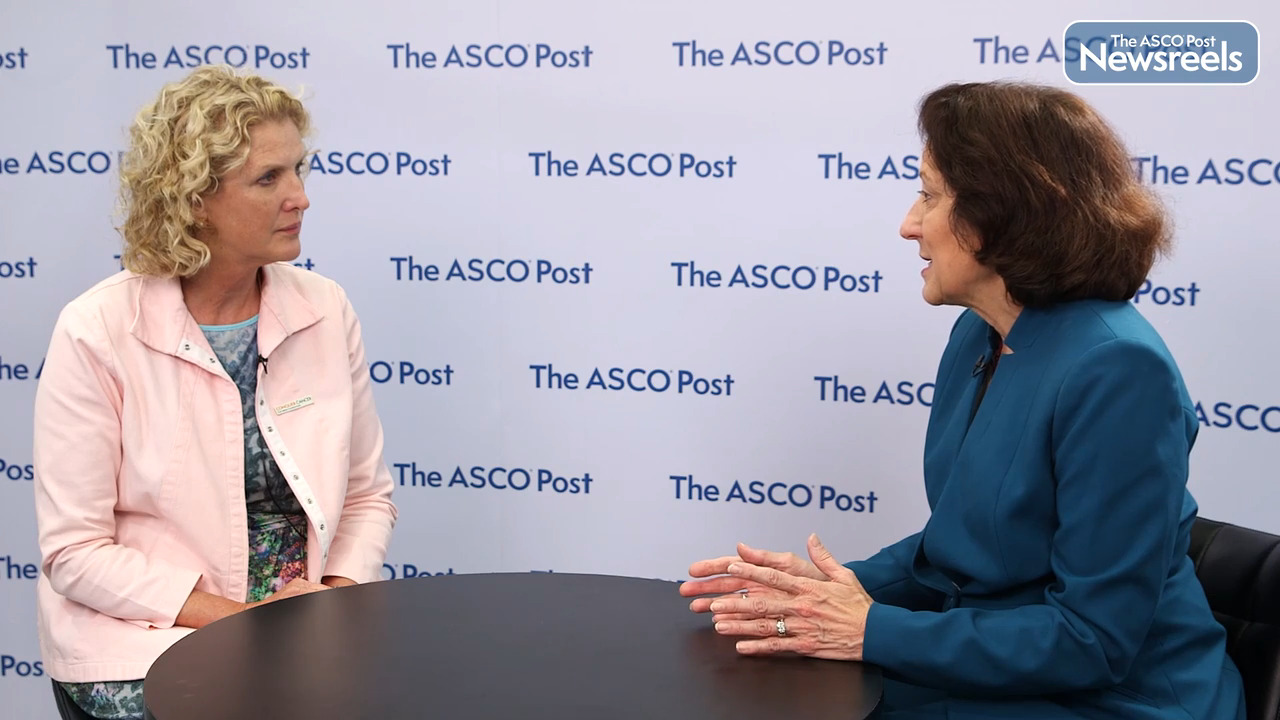Transcript
Disclaimer: This video transcript has not been proofread or edited and may contain errors.
As we know, trastuzumab deruxtecan was previously approved based on the results of DESTINY-Breast01; however, DESTINY-Breast03 brought trastuzumab deruxtecan up into the earlier line setting. This was a study of trastuzumab deruxtecan versus T-DM1, and what was presented was a safety update. So now the median duration of follow up remained at 6.9 months in the T-DM1 arm but has lengthened to 16.1 months in the trastuzumab deruxtecan arm.
What we saw in the safety update with further follow up was that grade 3 treatment-emergent adverse events really were quite consistent between the arms, 53% for T-DXd and about 50% for T-DM1. We also looked at adverse events that led to discontinuation, and that was a bit higher with trastuzumab deruxtecan, specifically 14.8% of patients compared to 7.3% of patients. If we look at why that is, it was really driven by ILD pneumonitis for trastuzumab deruxtecan, with about 8% of patients discontinuing due to ILD pneumonitis.
The most common reason for discontinuation with T-DM1 was thrombocytopenia. When we look at tolerability across the board, there were a few adverse events that were a little bit more frequent with trastuzumab deruxtecan: nausea, vomiting, and alopecia or hair loss. The nausea and vomiting events really in general were quite mild, grade 1 or grade 2. Interestingly, they happened right away in the early treatment cycles and then really stabilized over time and became consistent. So this emphasizes making sure that we're using good supportive care antiemetics for our patients.
There was a new variable we looked at, and it's something called exposure-adjusted incidence rates and exposure-adjusted incidence rates are standardized measure of risk per patient year used to describe safety in long-term studies where the follow-up between the arms may differ. When we looked at exposure-adjusted incidence rates, across the board these were actually lower with trastuzumab deruxtecan compared to T-DM1 with one exception, and that exception was treatment-emergent adverse events leading to discontinuation that was again driven by that about 8% of patients that discontinued due to ILD pneumonitis.
We also saw that time to either a dose reduction or a dose hold was longer for trastuzumab deruxtecan than it was with T-DM1, really again emphasizing that patients on the trastuzumab deruxtecan arm in general were tolerating therapy quite well and weren't experiencing side effects where they were needing to dose reduce.
Finally, when we looked at interstitial lung disease pneumonitis, which was a safety event we've been closely following due to the fact that there were fatal cases in the initial study with DESTINY-Breast01, even with this updated follow up, there are no grade 4 or grade 5 cases of ILD pneumonitis. In addition, grade 3 rates of ILD pneumonitis with trastuzumab deruxtecan remains at less than 1%, 0.8% to be specific. So this really reassured us as we're moving trastuzumab deruxtecan up into earlier lines, initially third line and beyond from DESTINY-Breast01, now in the so-called second line setting based on DESTINY-Breast03, and this really encompasses patients that have either progressed on a taxane or trastuzumab in the metastatic setting or relapsed within six months of neoadjuvant or adjuvant HER2 directed therapy.
There are trials ongoing looking at trastuzumab deruxtecan in even earlier lines, in first lines, in a so-called KATHERINE type indication for patients that may not have a pathologic complete response as well as even neoadjuvant. So very reassuring that we're no longer seeing any severe cases of ILD or pneumonitis, and that our patients really are tolerating trastuzumab deruxtecan well.





